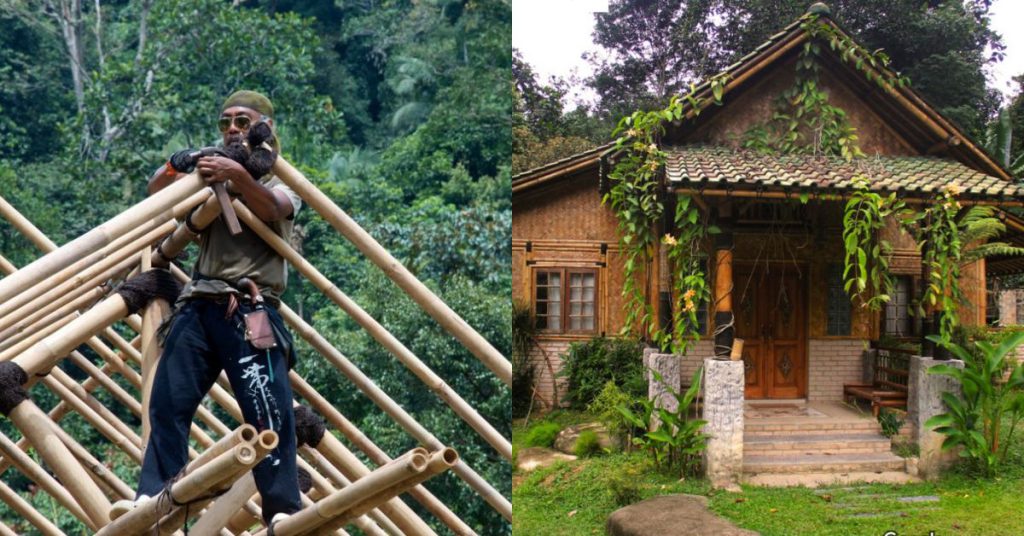When I jumped on a call with Mohd Ramadhan Abdul Hamid, I expected to just talk about bamboo architecture and whatnot.
However, the bamboo builder known for his Bamboo Village in Hulu Langat and The Bamboo Playhouse in Kuala Lumpur had much more to share than that.
Rather, our hour together was filled with an influx of information regarding the bamboo industry in Malaysia and its potential to become what Ramadhan calls “wood for the future”.
But to understand why he’s such a proponent of bamboo, we must first look to the past.
A purpose driven by passion
Before bamboo, Ramadhan had studied mechanical engineering and worked at a bank up until 2008 when he decided to quit his office job.
He had already decided then that he wanted to work with his hands, but his love for bamboo truly shot up whilst he was on the hunt for the perfect material to build his ideal family home.

One day while he was in West Java, Indonesia, Ramadhan found himself in some kampung areas where bamboo houses were aplenty. Ramadhan realised that was the thing that he had been looking for.
“From that day, I kept on learning about bamboo until now,” he shared.
Over the course of 15 years, Ramadhan has become a leading expert when it comes to bamboo builds, so much so that he said he doesn’t need to do any marketing to get projects. In fact, his anecdote on how The Bamboo Playhouse came into existence backs up this statement.
“What happened was that the Datuk Bandar Kuala Lumpur went to China and visited some bamboo pavilion and he was shocked,” Ramadhan said.

According to his account of the events, when the mayor returned to Malaysia, he announced that he wanted to build a similar building locally.
“Of course, everybody started searching the internet,” Ramadhan said. “So, they searched the internet, and at the end of the day, it was my face [that showed up].”
Ramadhan agreed to the project, but there was one issue in the way, one that would plague the industry until today—labour.
Challenges of the industry
Across industries in Malaysia, labour shortages have been a cause for concern, and this is no different when it comes to the bamboo field, Ramadhan said.
In fact, all his “special projects” are still completed by his team of builders from West Java.
As such, Ramadhan’s main focus these days has been on community farming, something he believes will help with the labour shortage in Malaysia.
Ramadhan himself has taken the initiative to train locals on building with bamboo. Much to his dismay, many of them don’t stay within the industry.
Another issue faced by the industry is the lack of demand. Ramadhan said the way to deal with oversupply could be through processing such as burning. This would produce charcoal, activated carbon (biochar), and bamboo vinegar.

Biochar is particularly useful as fertiliser which helps improve soil fertility and plant yield. However, Ramadhan believes farmers may still not yet be educated on the benefits of biochar and may feel hesitant about using it as opposed to the fertiliser they’re used to.
According to him, the “big boys” who are planting bamboo these days are LNG and FGV. He believes that they are working to create a new vertical that involves laminated bamboo, an alternative to timber.
While wood would take years to grow before it is ready to be manufactured into timber, bamboo is known to grow a metre per day and is regarded as the fastest-growing plant on earth.
Efficiency aside, this could also help in the fight against global warming.
However, an overarching issue with the bamboo industry is that the industry doesn’t even exist, at least according to Ramadhan.
“I don’t know whether you agree with me or not,” the expert said. “But to the best of my knowledge, there is no industry at all.”

Ramadhan used the analogy of the chicken and the egg. To start the industry, you must have a stock of bamboo. Yet to have a stock of bamboo, there must be an industry awaiting it.
“Both must come together,” he reasoned.
This is why he is now working with the Malaysian Timber Industry Council (MTIB) on the community farming programme.
From a third-rate crop to Malaysia’s third crop
For years now, Ramadhan has been an active proponent of bamboo. Yet, at the end of the day, still not a lot of people are open to jumping into the industry.
The general public doesn’t seem to have high regard for the plant either. From Ramadhan’s experience, most Malaysians only associate bamboo with lemang or rumah Orang Asli.
“In Malaysia, our knowledge of bamboo is still very small overall,” he said.
To counter this, the MTIB has initiated a National Bamboo Industry Development Action Plan 2021-2030 to work on issues the industry is facing.
This new action plan is a continuation of a previous one from 2011 to 2020, which Ramadhan said failed.
However, he noted that the second round has made great headway thus far, especially with the community farming programme.
With the right resources and developments, Ramadhan believes that bamboo is capable of growing into an industry as important as oil palms and rubber trees.
Shooting into the future
Having visited Bamboo Village before, I was keen to learn about how the idyllic little premise has been going for Ramadhan.
Surprisingly, though, the owner and operator revealed that there has been a lot of wear and tear on the village that he has been unable to fix as they require the expertise of builders from Indonesia. As such, he’s actually not taking guests anymore.
Knowing Ramadhan’s love for sharing about bamboo, this might seem to be a saddening piece of news. However, the cessation of his retreat is definitely not reflective of his intentions to continue being a proponent of bamboo in Malaysia.

“It’s all about the passion,” Ramadhan had quipped a few times during our interview. “Without passion, you won’t be able to do anything.”
Whether Malaysia will be an environment capable of fostering such passions, only time will be able to tell.
Featured Image Credit: Murujan / Mohd Ramadhan Abdul Hamid











